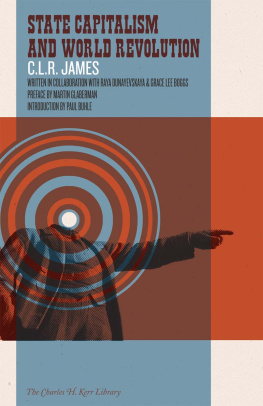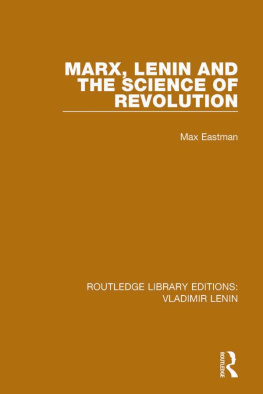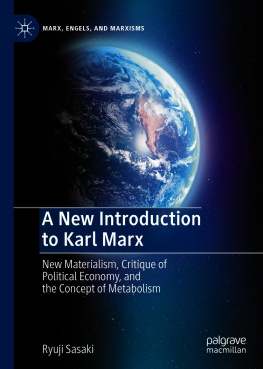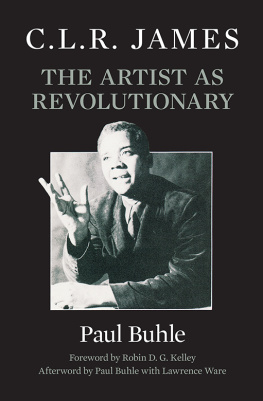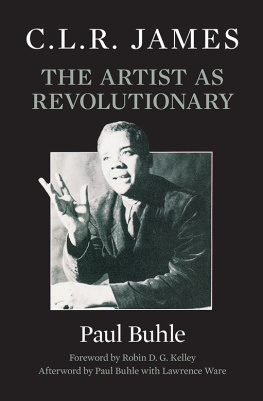
State Capitalism and World Revolution
C.L.R. James, Raya Dunayevskaya, and Grace Lee Boggs
This edition PM Press 2013
All rights reserved. No part of this book may be transmitted by any means without permission in writing from the publisher.
PM Press
PO Box 23912
Oakland, CA 94623
www.pmpress.org
Published in conjunction with the Charles H. Kerr Publishing Company
C.H. Kerr Company
1726 Jarvis Avenue
Chicago, IL 60626
www.charleshkerr.com
Cover design by Josh MacPhee/justseeds.org/antumbradesign.org
Layout by Jonathan Rowland
ISBN: 978-1-60486-092-4
LCCN: 2012913639
10 9 8 7 6 5 4 3 2 1
Printed in the USA by the Employee Owners of
Thomson-Shore in Dexter, Michigan.
www.thomsonshore.com
Contents
A Note to the 2013 Edition
T IMES HAVE CHANGED and changed again (one could easily say, again and again and again) since the original publication of this unique document in 1950. As I explain below in the Introduction to the 1986 Editionwritten only a few years before I took up the task of writing the authorized biography of C.L.R. James, and James himself passed awaythe principal author had moved from obscurity to celebrity during the 1970s. By the time of the 1986 edition, he was the minence grise of Pan-Africanism, because he had outlived his generation, but mainly because he was an infinitely wiseto the casual look also infinitely agedworld historic revolutionary.
Capitalism, globally centered in the American empire, regained its strength and self-confidence by the early 1950s, then lost much of what it had gained by 1970. The Marxist analysis that James and his collaborators had laid out then appeared vindicated, with the demographic changes in the workforce bringing layers of women and nonwhites into production and distribution. But deindustrialization was only around the corner. The triumphant capitalism of the 1990s, basking in the warmth of the East Bloc collapse but also in the money-gush of financialized economies, would seem to have wiped the theories and implied strategies of State Capitalism and World Revolution off the map. State capitalism as a system had indeed spun downward in its own contradictions, but corporate capitalism was the apparent victor, with the spoils going to new classes of exploiters. Only China, more capitalist in its state capitalism than ever before, remained vital, an obstacle but also partner to an all-out triumph called the End of History, that is, the history of class struggle. That was, of course, a superficial and self-interested reading of the situation.
What would C.L.R. James have made of the failed imperial wars in Iraq and Afghanistan, the implosion of the finance-capital economy, and the election of a nonwhite U.S. president presiding over the deeply troubled empire? We may be sure that he would have insisted upon the inevitability of the economic and social contradictions, and would have responded eagerly to Occupy, as the voice of the voiceless, come onto the stage of history to be heard. It was in his natureand so unlike many a would-be Marxist savantto look for what was new, what fresh stream of activity caught public attention and encouraged bursts of rebellious activity along new lines.
James wrote the remarkable foreword to the 1986 edition against the background of the Solidarity movements triumph in Poland. It bespoke an optimism that carried over in many places, especially East Germany, with the fall of the Communist regimes, that something better, more tied to working class life and collective self-determination, was possible, if not certain. That hope disappeared rather quickly, although not without leaving behind new formations symptomized by the appearance of the Left Party in Germany, during the era to follow. More to the point, in some ways, the vast Communist Party entourage in Italy, for a time the largest political party of any kind in Europe, all but dissolved in the aftermath of the East Bloc debacle. It became clear that the Communist following had been mainly old-time faithful, and with their passing went the factories they had worked in since the Second World War, and the basis for the European Left. So little seemed to be left behind at the dawn of a new century.
The same was true, of course, for European socialist parties, more subservient than any but the most cynical observer could have predicted to the new austerity programs and the steady rollback of social safety nets, victories in lowering the retirement age, and so on. The successes of the social democratic struggles in modifying and even creating a particular state capitalism were now at an end.
And yet the importance of the history of the working class as a global phenomenon remained, and not only because a vast new working class had emerged in China and begun to struggle for collective self-recognition. How had the vast Left movements of the twentieth century run aground? What in Marxist writings helped explain successes and failures, especially the storied triumph of revolution in Russia, and its retreat? State Capitalism and World Revolution remains a vital read, if not necessarily an easy one. And C.L.R. James, in this writing as perhaps nowhere else (except The Black Jacobins and Beyond a Boundary) reveals what he has to say to the future.
Paul Buhle
Madison, Wisconsin, April 2012
Fully and Absolutely Assured
(C.L.R. James Foreword to the 1986 Edition)
T HIRTY YEARS AGO those who adhered to revolutionary Marxism or who thought about it were in ferment. Dominating the discussion were the views of Trotsky, who was universally looked upon as continuing the Marx, Engels and Lenin tradition. In fact Trotskys name was used most often in association with Lenin. Lenin and Trotsky summed up the official Marxist position of the day.
The importance of State Capitalism and World Revolution, published in 1950, was that it not only projected a theory of state capitalism, but at its very beginning it stated definitely and unequivocally that Trotskys whole method of analysis and results were to be repudiated. As I look back at the appearance of this document and those days, I am frequently reminded of the fact that some of the people in the United States who read it were not so much impressed at the beginning with the theory of state capitalism: They were startled and, in fact, bewildered at the fact that I had challenged directly the Marxist ideas of Lenin and Trotsky (as they thought it)the Trotsky who had led the October Revolution to victory.
The power of the Johnson-Forest Tendency, which led them to challenge with such effrontery the leader of the Third International and the initiator of the Fourth, was the last writings of Lenin. Today, thirty years after this document State Capitalism and World Revolution was produced, the writings of Lenin, particularly in his last days, still remain the foundation of any attempt to observe, to organize, to assist in any way the movement toward Marxismthat is to say toward the emancipation of the working class.
That last phrase sounds awkward in my ears today. Today I do not know of any body of people who speak or preach with any confidence of the emancipation of the working class. People are not against, not at allbut they are not for. Political thought in relation to society at this most critical period in human history is in a state of suspended animation. That is not quite true. There is no animation, but there is not stagnation. There is a conscious desire to wait and see.
Next page
